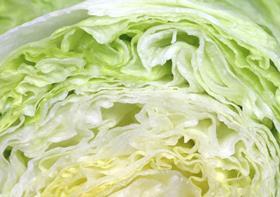
A new breeding project is underway that could lead to longer shelf-life for leafy salads.
Researchers at the University of Southampton have been working with Vitacress to understand what keeps salad leaves fresh for longer, and they discovered that using less water when growing salad actually improves its shelf-life.
Scientists are now running a breeding programme in which crop breeders are selectively breeding plants with the genetic material responsible for leaves with a longer shelf-life.
“We were able to show that if you reduce water use in intensive salad production by about 20 per cent, you actually develop smaller, tougher leaves with stiff cells walls, which is what we’re interested in,” said Professor Gail Taylor from the University of Southampton. “And at the same time, the company can reduce its water footprint.”
“So we’ve used fundamental biological knowledge and applied it both through the genetic route and through crop production techniques to help the company [Vitacress] improve the quality of its product,” she adds.
Taylor and her colleagues, together with Vitacress, used funding from an Industrial Partnership Award (IPA) from the Biotechnology and Biological Sciences Research Council to work out the genetics of processable salad leaves so that this information could be used by industry in salad crop breeding programmes.
First, they identified what it was about certain salad leaves that gave them a longer shelf-life. They found that smaller, tougher leaves, with lots of small cells packed closely together, lasted longer. They then worked out which regions of the lettuce genome were responsible for these desirable characteristics.
Dr Steve Rothwell from Vitacress said: “The results open the door to exciting further studies across a wider range of crops and geographies aimed at driving down the use of water while improving crop quality and shelf-life.”
Following the success of their IPA project, the partnership between the researchers and Vitacress has grown to include a seed company in the USA, which is using the results of the project in its breeding programmes, and Sainsbury’s, which sells many of Vitacress’ products. Sainsbury’s and the seed company have jointly funded two of Taylor’s PhD students.



